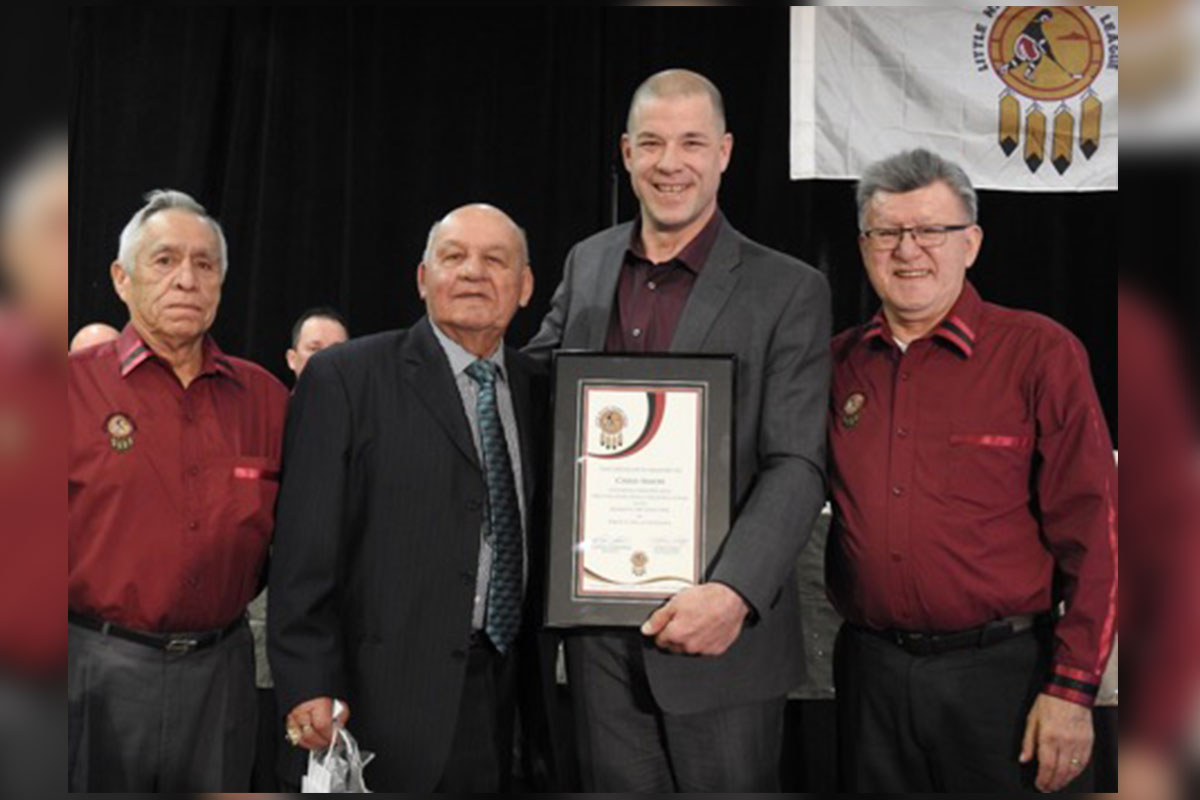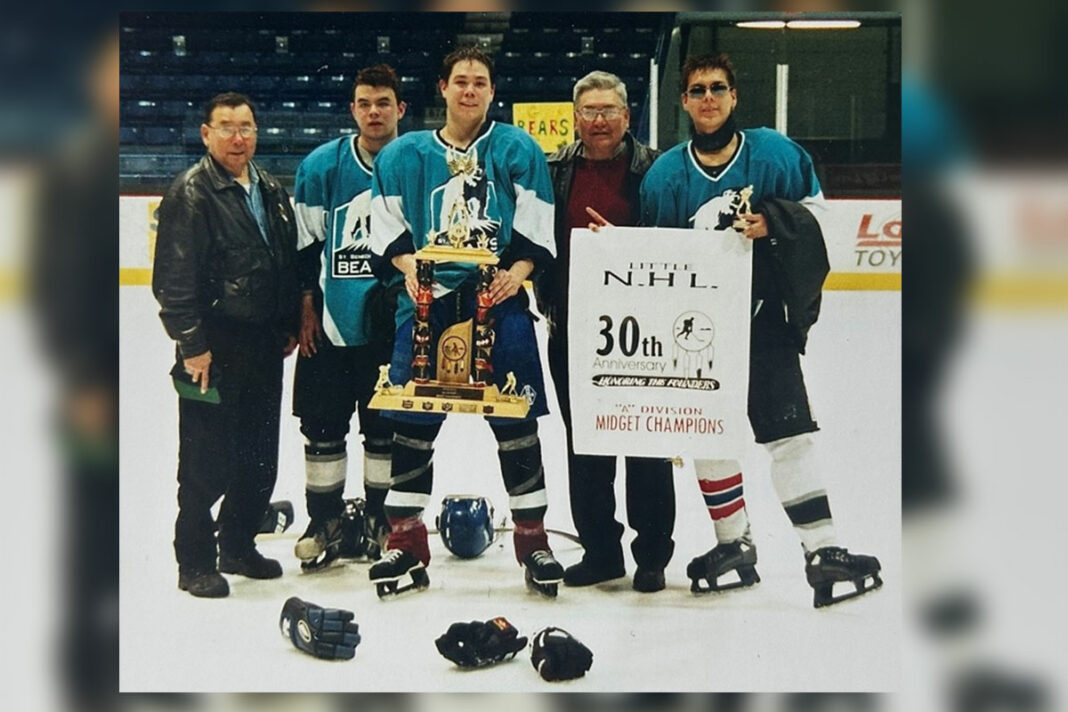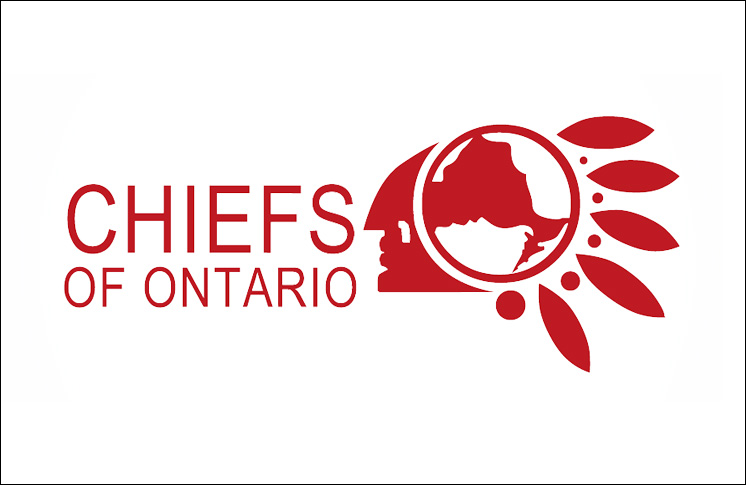The last ‘founding father,’ Jim McGregor, pleased founding ideals remain important
EDITOR’S NOTE: This year marks 50 editions of the culturally important Little NHL (Native Hockey League) tournament and, over the weeks leading up to the Markham event, Expositor reporter Gina Gasongi Simon will trace the evolution of the tournament from its origins as a two-day local event in 1971 at the old Little Current arena to the massive undertaking it is today with nearly 250 teams participating from all corners of the province. This week’s installment, the first, examines its origins in the 1970s.
BIRCH ISLAND—To truly understand ‘home ice advantage’ we must realize the growth of hockey in Canada and the need for opportunity for First Nations children to play the sport. Those seeds of equity and opportunity were planted in 1971 by Jim McGregor, Jim Debassige, Norman Debassige, Earl Abotossaway and Rev Len Self.
The tournament was established based on four pillars: sportsmanship, respect, citizenship and education.
During its humble beginnings in December 1971, a mere 17 teams registered for the 1st Little Native Hockey League (LNHL) tournament hosted in Little Current.
The last standing member of the original founding LNHL members, Jim McGregor of Birch Island, remembers fondly that first tournament. “I thought it would be a one-time deal. It was a lot of work at first, getting the word out, and then it seemed to spring a life of its own.”
After that initial tournament Jim thought that was it, but folks started asking, “When will the next tournament be?”
“My sons told me how much they enjoyed the tournament and suggested, ‘We should do it again, Dad.’ And so, I thought about it for awhile and then started making calls. It just took off. The next year it was in Espanola. After that I barely had to say two words about the next year and the next year, people and communities were right there, offering to host and organize.”
As it continued to grow, it was moved to other locations like Sudbury, Sault Ste. Marie and Thunder Bay, along with other smaller locations but because it has gotten so big, it required a bigger venue.
The modern day LNHL, according to organizers, has a record number of 246 teams suiting up and hitting the ice in what will mark the 50th anniversary of the LNHL.
For many First Nation communities, this tournament is a hallmark hockey event for all players, parents, family and community members to participate from the ice to the stands. It is a gathering with the potential for positive change toward hockey equality.
A growing addition to the historical tournament will witness a record 38 girls’ teams registered in the competition, proving the original seeds planted flourished as the number of participants grew, making this now the largest Indigenous youth hockey tournament in the province.

‘Build it and they will come’ they say, and the numbers don’t lie, just do the math. When you calculate the players, team staff members and fans that number explodes into the thousands. This year’s theme “Honouring our Water” has exceeded expectations for many, including members of the original organizing committee.
Jim has been a constant presence at the tournament and figures he has been to more than half the tournaments. “It is a big deal. It brings families and communities together to celebrate and have fun.”
For him, it’s more than hockey. “The LNHL has proven itself. I am pretty happy with the publicity the tournament is receiving. It’s not about me, it’s about these kids. Some kids tell it was a moving experience for them. They gained confidence and when I asked them, ‘what are you doing now?’ some tell me they went off to school to obtain a degree in law or science. I marvel at the positive energy and determination of our young people. We need more chances and opportunities afforded to them, to prove they can make it,” Jim explained.
“You see some of the same faces year after year at the tournament.” New generations take to the ice, children and grandchildren of former participants in the tournament. Jim especially loves seeing players grow up throughout the years. “You know some have moved on to make the big leagues; some are satisfied just having played in this tournament.”
To get there takes months of fundraising campaigns for all First Nations communities. Those passionate volunteers, coaches and family members need to be commended for all their efforts. A gathering of this caliber requires an endless score of volunteers at all ends of the spectrum. That in itself is another story, to do justice for those individuals.
For some, the tournament may seem to segregate Indigenous players but to those involved, it has eliminated barriers to participation and truly fostered inclusion—not only creating conditions of safety but also a place to show your colours and shine.
Over the years various NHL scouts and even NHL trophies have been displayed at the LNHL. The most coveted, the Stanley Cup, made its appearance back in 2019. Motivated… There are always good stories shared at the LNHL and moments of inspiration that stand the test of time.
This year’s host is the city of Markham, which underwent stringent competition to become the host city. The majority of matches will be held in Markham; however, arenas just a ‘stones-throw-away’ located in Richmond Hill and Stouffville will be used to host some of the matches.
A gala will be held at the Hilton Toronto Markham Suites Conference and Spa on March 9 with a total of 15 individuals to be inducted into the LNHL Hall of Fame. The three categories are Alumni Players, Builders of the LNHL and Friends of the LNHL.

To headline the evening gala will be Wikwemikong’s Crystal Shawanda. Followed by Opening ceremonies, which will include a host of festivities combined with a presentation on the history of LNHL, to be held March 10, at the Markham Civic Centre from 12 noon until 7 pm.
As the last founding original LNHL member, Jim says, “I’m really looking forward to the LNHL celebrations. I never realized I would make it to see 50 years. I am the only guy left standing and when I think about that, it is quite a milestone. Looking back, I never thought we would make it this far.”
The LNHL brings youth together to play with pride and showcase their communities and is grateful to partners such as Ontario First Nations Technical Services, TD, Ontario Power Generation, St. Clair College, Abbey’s Goal, Hydro One, Agnico Eagle, Dreamcatcher Charitable Foundation, NADF and Society United Professionals for generously supporting the tradition that creates so many lasting memories and friendships.
Honourable mention for advocating hockey development in their communities goes to George Francis Henry, Paul Williams, Marian Jacko, Henry and Margaret Shawanda, Tom Nolan, Ted Nolan, Chris Simon, Gerard Peltier, Kathryn Corbiere, Pat Madahbee, Lloyd McGregor, Violet McGregor, Elizabeth Debassige and Marvin Assinewai— just to mention a few alumni.
New LNHL President Chico Ralph and mentor and former president Marvin Assinewai of AOK are working diligently behind the scenes to try and bring as many alumni and the founding members, their spouses and family to the event. Both gentlemen agree, “If it were not for all the support and the love of the LNHL, it would not exist, or have grown the way it has. Come March break, the LNHL is where it is at,” Marvin chimes in.
In keeping with the four pillars of LNHL, current President Ralph explains that, off the ice, there are booths in the arenas that provide young people information about education and career opportunities. While the arenas are thundering with cheering crowds and everyone vying to get the best view of the ice surface, the last monumental pillar, Jim McGregor, will humbly take his place as a motivator and role model while mingling amongst the crowd of cheering fans.
For Jim, what will resonate is “seeing all those smiling faces of children and hearing the beat of the drums during the opening ceremonies. The LNHL will always have a special place in my heart,” he concludes.
Next week, this series will examine the evolution of the tournament through the 1980s.
by Gina Gasongi Simon





